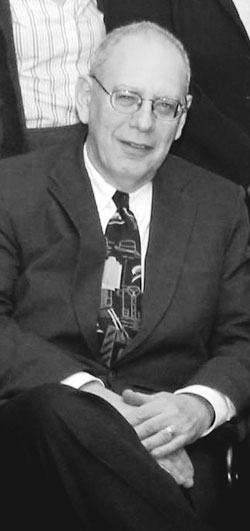Creative accessibility marks new School of General Studies

Provost Martin Singer at a reception for outstanding Concordia researchers held in February.
Marion Elissalde
The temporary name may be banal: the concept is anything but. For Martin Singer, the School of General Studies represents a commitment to the past and a vision of the future.
The Provost is shepherding the new School through its growing pains. He is chairing a transition committee of shareholders, who have created task forces to handle specific challenges such as special credit and non-credit programs for at-risk students, an integrated marketing strategy, staffing needs and space requirements.
A shortlist is forthcoming of candidates for dean, and the post is expected to be filled by the time Singer leaves the Provost’s office at the end of June.
In an interview, he set to rest some misconceptions about the new unit. “The downsides are mostly red herrings,” he said.
First, it’s not a money grab. The School will be entirely self-financing. Courses will cost students precisely what they cost now. Credit courses will be under the jurisdiction of the academic faculties, and will continue to be funded, for the most part, by the government.
What makes the School unusual is that it will blend credit and non-credit offerings in programs designed for the needs of specific students.
Through this modular approach, students at risk can pick up study skills (a non-credit component) and apply it to their academic courses. Students from abroad can study the Canadian way of life (another non-credit option) in their own environment before coming here to enter the academic mainstream.
Students whose applications to Concordia have been rejected (and they number in the thousands) will be able to take specific non-credit courses to enable them to apply again — successfully.
In these ways, Concordia will be able to retain and encourage students who now are falling through the cracks. Every student who is guided into the academic mainstream represents about $9,200 in tuition and government funding for the university. More important, it represents a personal victory for that student, who might have lost heart and faded from sight under the current regime.
Singer was one of the founders of five schools and colleges at Concordia back in the 1970s. When he was asked by incoming president Claude Lajeunesse to integrate continuing education with the for-credit faculties, he responded with determination and energy. He has come to see the School of General Studies as another step in Concordia’s promise to be as accessible as possible while maintaining academic standards.
He said attending the funeral March 15 of the mother of longtime Concordia employees Enza and Johanne De Cubellis reminded him how important it is for so many parents that their children get the higher education they were denied by circumstance.
When he talks to international students, he is struck by their need for the most basic survival skills: “Some students are walking around with large sums of money because they don’t know how to open a bank account.” He thinks an orientation course on living in Montreal could be a remarkably effective recruitment tool, especially if it is given on site, with the students’ parents present.
While some universities already offer for-credit courses in their extension (or continuing education) arm, Concordia’s approach is more ambitious. It brings together discrete administrative silos such as Continuing Education and the Centre for Mature Students into what Singer sees as a creative opportunity to deliver education more effectively.
He expects the use of the web to expand, and points out that while eConcordia, the company owned by the Concordia Foundation, offers 14 courses, many more are offered directly by the four faculties and the Centre for Continuing Education. This trend can only grow and diversify as higher education goes global.
The dean of the School will have a support staff to help manage the packaging, marketing and delivery of all these programs. Singer hopes they can count on the full cooperation of everyone at Concordia in order to make this initiative a shining success.